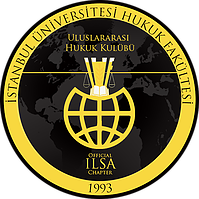
Interview: Gülce Ataman, Muhammet Bembeyaz
Translators: Yakub Topçuoğlu, Ali Göçmen
Editor of the translated text: Sena Mutlu
Since the first meeetings that we started to gather, we acted with the thought of turning the experiences of our friends into a benefit for those friends interested in particaping in the commemorandums. In this respect, we had a joyful interview about Vis (Willem C. Vis Moot Court Competition) and Telders (Telders International Law Moot Court Competition) with the fourth grade student of our faculty Ece Özsü.
Hi Ece, first, could you tell a bit about when you have participated and in which commemorandums you have taken part? We also want you to provide us with information about Moot Court generally.
I participated in Telders competition in second grade. Let me tell you about Telders a bit. Telders is a competetition which is about international public law. They give you a hypothetical case which is about a dispute between two states in the competition. As competitors, they expect you to solve this dispute in ICJ (International Court Of Justice) and the competition goes on according to that procedure. In the first part of this competition, each team prepares memorandums for both claimant and respondent. This written stage continues for approximately six months. Subsequently, it continues with the verbal stage. After you had written your memorandumsmemorandums, you should get prepared for your speeches. Because when you get in to the court, you present your argumentsorally. Then you getmatched with another team, you keep the process just like a case. In your speech, you sum up the arguments in your memorandums. This situation is the same both in Telders and Jessup. Your memorandums and pleadings are also being evaluated and a ranking is formed based on your total score.
Let’s compare with Vis a little…
Vis is a competition which is relevant to the international commercial arbitration and private law. You prepare the speeches and memorandums according to the arbitration rules of the institutions adopted for the relevant year. The same process is valid in Vis, too. You prepare memorandums for both sides. You present your arguments to the arbitral tribunal. There are differences between the two competitions in terms of subject. Procedures are also very different. In one of them, you are in an international court and your style of addressing is special. In the other one, you talk to the arbitral tribunalacross from a table. You can address the opponent team so easily. You can debate your ideas more comfortably with them. Both of them are great competitions.
In which class did you participate in Vis?
In third grade.
Well, what were you expecting before attending the Telders in the second grade, especially? Now, when you look at the past, does what you gained match up with your expectations?
To take part in a Moot Court team, I took an exam at the end of the first year of my school. At that time, we were inexperienced and we didn’tknow what was going on around us. First, while I was trying to get in a Moot Court team, I was not sure that my english was really good but I was able to read and write. Moot Court is really an important process in itself to learn some terms of law and the legal terminology. It improved me in that way and so my expectations were met.
How was the influence in asocial aspect?
The written stage is a really difficult process in terms of social meaning. You just can’t think about something like (social life) that because our university is really hard. While the exam system is on a yearly basis, the classes are really hard… Here, since you have to study hard, you can’t have any social life. However, when you go to the competition and see the atmosphere there, you can gain great benefits in socially. Maybe it is a bit early to say these, but we had contacts with experienced lawyers too. They can explain these better. Nevertheless, I have so many friends studying law -most of them have graduated-in many parts of Europe. In the future, when I want to make a job application or make a master’s degree application; for example in the Netherlands, when I want to make a master’s degree application to Leiden University, I have friends to counsel and get information from. This is the greatest gain in a social aspect, at the same time it is an academic benefit too. Besides it absolutely widens your point of view. You meet people from different countries and also with their education systems and law systems and all of these things happen in just a week. People are not only there to compete but also to network with each other. I think that Moot Court is the greatest thing to be done by a law student in terms of social network.
How did you hear of it? How did the application process proceed?
This is a great problem in our university. My meeting with Moot was extremely coincidental. One day while I was walking in the hallway in the campus I saw a very small add on the board.”Those of you who want to participate in hypotetical case competition, the exam is on the date of… and applicants should send an email to… person”.While I was trying to understand the issue, I thought that it was a similar thing to Jessup because I had heard of Jessup. Then, I thought that I should take a look at this and that was done so unconsciously. There are lots of students in the fourth grade saying that “Uh uh! There is a thing called as Moot Court. I haven’t heard about it at all”.Therefore, as ILSA Group at the beginning of last year we dealt with this issue and organised an introductory meeting. At least, we hoped to create a research pool by the participants from the first and second grades. We hoped to get experience because you reel under of a really great work. After being in a first grade research team, in the following years it would be really easy to prepare memorandums.
The process in our school is that, international law department schedules a written exam and an interview at the end of the year-generally in May or June. In the written exam, you are supposed to translate a text. I took this exam three times. In one of them we were also supposed to write a little about why we wanted to participate. Generally, one of the translations is about public law and the other is about private law. In the interview, the jury evaluate how eager you are and also if you are serious or not. The interview is conducted English. After wards the departmentannounces a list of students who are being accepted. For instance, the Vis list consisted of ten students. However, the list of Jessup and Telders have to be eliminated because of the limitation on the number of speakers.
Could you tell us about the process right after you have been chosen as a member of the team? For istance meeting the team, getting used to texts, regulating your own life. What were your teammates capacities? How prepared were you for the english text previously, how did you improve yourself?
When we started we were eight or ten students but after we started to meet with our coach, some of us lost their motivation, some chose another field and then we remained six students. Four of them including me were at the second grade and the others were at the third grade. That was the situation of our team. The adaptation in the aspect of the english language was not so easy. At that time, we were supposed to read two or three thousand legal pages nearly in ten days. Imagine that you didn’t get the International Law lecture and so there are lots of english texts about the subjects you didn’t hear about even in Turkish and you were supposed to read and comprehend and also reason them out. At the beginning, highlighting every words meant spending lots of times for just a sentence for me. This situation fastened after a few months. It was a great benefirto me with respect to improving both my language and reasoning skills. However, it was really hard to get it done socially. You try to study for theclasses and also the Moot Court which is really hard. On the one hand social life, the reston the other… When these things lead up to issues, naturally you get tired a little bit. You cut down on sleeping and sacrifice your social life a little and try to get by.
How did you hold the balance between school and the Moot Court? As you are a fourth grade student now, how is it going with the classes? How did you manage your the responsibilities?
Infact, my GPA is not very bad at all. It was really hard, however. Generally, midtermsare not focused upon. Because that midtermperiod coincides with submission date of the memorandums for the competitions. You pass the midterm period without much care. That is the common sense of faculty’s students. The competitions were mostly organized at the beginning of April or in the end of it. Sometimes Vis Moot was organised at the beginning of April. So, it was not easy. Especially, let me tell you about the last year I remember that better. Without seeing anyones face I had to lock myself in the house for two months because we were trying to learn the entire issues of the year just in two months. In the second term, since we were preparing for the oralstage, it was a problem for us to attend the classes. Nevertheless, some how it was going but maybe it was my personal situation. Because I had lots of friends participating in Moot Court and some of them failed at a few exams.
Well, while participating in a Moot Court was it a main focus for you or a secondary activity besides your school?
Moot Court was my main focus. After all, we were representing our university. First of all your coaches and then your school and your friends they all have expectations fromyou. The people supporting you in every sense both morally and financially, have expectations from you. I think that it should be a main focus ofall the students participating in Moot Court, because the classes can be handled in a way.
Could you tell us about the teamwork?
It is not an easy thing to be in a team and do something together with the people you don’t know. Naturally, it is a process of getting used to each other. Our workshare were related to our arguments in Telders. We all distributed the four arguments and while preparing the memorandum we all wrote different things. Everyone prepared different arguments. Then, before sending the memorandums we have checked them for ten days. Particularly, I want to mention those ten days. That was a toughprocess. We were under time limitation and under pressure.
Well, some things must be sacrificed.
Already, in teamworks you need to make sacrifices in numerous aspects. Naturally undersuch a stress, not everyone can smile. First, you have to control your voice while talking to a teammate about an issue. Business life is like this too, we may somehow think this as a practice for it. At that period, rather than seeing my parents and friends, I was meeting with my teammates. That is not a easy thing. From waking up until you go to sleep. You learn how to make up the mistakes of your friends but, you are not doing this favor for yourself, just for your team. To learn and be aware of this thing is really significant and nice.
Let’s hear something about the competition period? Was there any pre-elemination or etc.?
Let me make the comparison of it with Jessup. In Jessup and Telders, every country can participate with only one team. If the applications are above a specific number, the participants from a country may go up to two. The quota in Telders is up to eight teams. At that term, we didn’t participate in national rounds because there was noother team participating from Turkey. According to the speculations that we had heard about, other universities would participate next year in Telders too. Let me talk about Jessup, there are lots of teams of all the well-known law faculties and a national round is held there. This national round was held that year in our university. When I was in the second grade, I mean two years ago, it had been held here. The system was like that you prepare the memorandums again but you get ready for the speeches a bit earlier there. You present your arguments to the jury consisting of Turkish lawyers and scholars, the same procodures are applied.
In Vis, there is a preliminary competition called Pre-Moot. There isn’t any local elimination and every country can join with unlimited numbers of universities. Universities asking to hold it can organize their own pre-moot competitions, imagine them as a practice match.Having been created an arbitraltribunal consisting of lawyers,arbitrators and scholarsfrom those countries,mini challenges occurthere.Bilgi University organise this in Istanbul.While we were preparing for Vis we went there too.
Could you give us some information about the cities in which the competitions took place?
Telders tookplace in Lahey, Netherlands. You go to ICJ(International Court Of Justice) to participate in the competition, that was really impressivefor me. Think of a student in second grade, a law student and at ICJ in Lahey. You look at that building, entering it, so impressive.
Infact the Vis has two parts:The East side and the West side.The west side is in Vienna and the city is beautiful.Since the Vis continues a bit longer you spend much more time in Vienna,nearly eight or nine days.You do both, something about the law and get a chance to travel the city,this is really special.We also participated in a pre-moot in Belgrad.This year’s team went to Amsterdam,Belgradeand now they are on their way to Vienna.Jessup is organised in Washington D.C., U.S.A. but to participate in that you have to pass the elimination.
What was the things that this experience changed about you? Especially about the university; for example do you think that it commits you to the school more?
First of all, I’m really happy to have had theexperience in Moot Court competitions. Even this year I’m really upset not to have joined it, I wish I had joined. At first, your teammates become your best friends socially. We are still trying to meet with Vis participants at odd times. And I absolutely agree that it bonds me with the university. Because when I was in the first grade I was just going to classes but in the second grade, I was trying to do something for my faculty and university and naturally this strenghtend the tie between me and my university.
Are there things that you think would be lacking if you did not had this experience?
Not one by one, but, let me tell you something general. First, my perspective really widened. Let me tell you about Telders, during the competition. There were twenty-eight teams but only two of them were at bachelors level and one of them wasour team. Our rivals were in master’s degree who were writing athesis about this issue. It is really an important thing to learn something and get these things as benefitsfrom your rivals during the challenge. Witnessing the education system of European law students and the outlooks of them changed my view too. Both, in a social aspect and in a legal aspect… For instance, I hadn’t studied for the Internatiol Law’s final exam because I had dealt with it during thewhole year. I have gaineda lot.
What are your recommendations to the students asking to participate in Moot Court, for example to a first grade student?
When I started the Moot studies, I had already finished the first grade, I recommend them to study English and not to waste their times in the first year. They should at least increasetheir levelup to the Upper-Intermediate. Because the process is getting really hard if you’re under that level. They should read something about the competitions that they want to participate in. They should determine what the subjects are about and to which they feel close to. I advise them to talk to former Moot participants because when you talk tothem you are sure that Moot Court is a great thing. Naturally, there could be a few challenges but as a result it is an awesome experience.
Thank you for your answers that was really informative.
Thank you.

